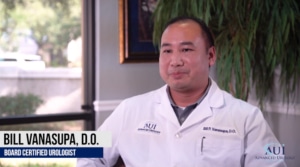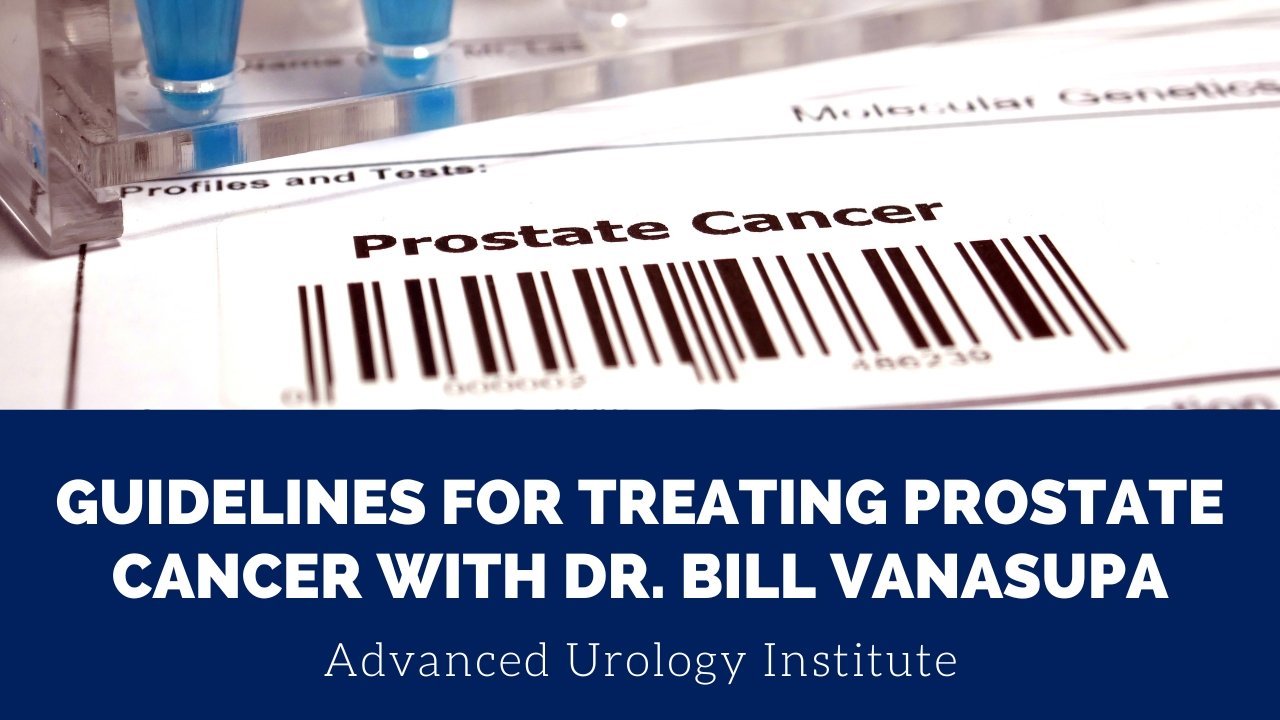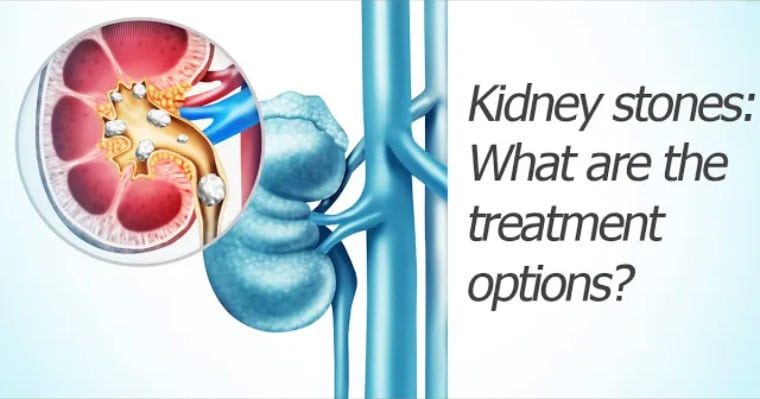In this video, Dr. Bill Vanasupa, a board-certified urologist, discusses the effectiveness of medications for treating erectile dysfunction (ED). He notes that not all patients respond to medications and that the level of response can vary based on factors such as comorbidities, heart issues, and diabetes.
Continue readingGuidelines for Treating Prostate Cancer with Dr. Bill Vanasupa
Dr. Billy Vanasupa talks about the importance of informed decision-making when it comes to prostate cancer treatment. While medical professionals can offer guidance and recommendations based on the latest research and guidelines, ultimately, the patient should have a say in their treatment plan.
Continue readingHow Do You Treat Kidney Stones
Treating kidney Stones depends on the degree of the pain the size of stone. Learn more from Dr. Billy Vanasupa of St Augustine, FL.
Continue readingDiscussing a Sensitive Topic: Erectile Dysfunction
 A urologist is a doctor who specializes in the urinary tract and male reproductive system. They are the doctor a patient will most likely to go to about his ED. Urologists see countless cases of ED on a regular basis, and to them it is not a major issue at all. However, good urologists understand that ED can be an embarrassing issue for their patients and they immediately begin their visits by creating a comfortable environment where doctor and patient feel at ease discussing it.
A urologist is a doctor who specializes in the urinary tract and male reproductive system. They are the doctor a patient will most likely to go to about his ED. Urologists see countless cases of ED on a regular basis, and to them it is not a major issue at all. However, good urologists understand that ED can be an embarrassing issue for their patients and they immediately begin their visits by creating a comfortable environment where doctor and patient feel at ease discussing it.
One such urologist who works to create a comfortable environment is Dr. Billy Vanasupa. When talking about his approach with patients who see him for ED, Dr. Vanasupa says, “I always try to make my visits light, make some jokes here and there, and make them feel comfortable.” His goal is to make his patients laugh so they are less nervous and feel they can easily talk to him. Dr. Vanasupa removes the stigma of ED so he and his patient can openly discuss this sensitive topic.
Once everyone is comfortable discussing the topic, the urologist will ask background questions like whether the ED occurred slowly or abruptly. The patient will be asked if he has tried any medications. The doctor’s questions are to help determine root causes for the issue and will include asking about diet, alcohol and drug use, and stress factors. Finding possible causes for ED is an important first step in treating it.
The urologist and patient will discuss best treatment options for ED. In many cases, oral medication, possibly along with some minor lifestyle adjustments, will fix the issue and allow healthy men to return to their normal sexual activity. For some men, oral medication does not help. The urologist may suggest injections. Patients will learn in the office how to administer a very low-pain injection at the base of the penis. There are very few cases where neither the oral or injected medication solves the issue.
Outcomes are best when the patient feels comfortable talking to his urologist about sensitive issues. The Advanced Urology Institute has urologists who can treat erectile dysfunction in a way that puts a patient at ease. For more information, visit the Advanced Urology Institute website.
How the Prostate Changes As You Age
The rate of growth is different for everyone. The prostate will grow faster in some men than in others. In some cases, the enlarging prostate can cause problems immediately for a man in his early 40s. In other cases, men may be in their 80s or 90s before they begin to see the effects of a growing prostate. Most commonly though, men in their late 50s and early 60s begin to experience urinary issues that begin slowly and increase in severity.
Some of the most common issues are the slowing of the urine stream, pushing to urinate, having to go back to the bathroom 10-15 minutes after urinating, feeling like the bladder may not be fully emptied, and having to get up frequently at night to go to the bathroom. All the symptoms can be associated with the frequent and sudden urge to use the bathroom.
These symptoms are a sign that it is time for a man to see his urologist. The symptoms will only increase in severity without treatment as the prostate continues to grow. The urologist will begin by helping a patient understand what is causing the issue, using a diagram to show where the prostate is and how it presses on the urethra as it grows. The enlarging prostate makes it difficult for urine to pass through the urethra on its way out of the body.
Treatment begins with medication to help with urination. These medicines help slow the growth of the prostate and relax the muscles around the bladder to make urination easier. A urologist also will do a PSA test to screen for prostate cancer. Not all cases of prostate enlargement are connected to cancer growth, but it is important to screen for the disease as a precaution.
Men’s bodies change in many ways as they age, and the prostate is no exception. Urologists at the Advanced Urology Institute focus on making sure their patients understand how their bodies are changing with age and how they can work with their urologist to stay in the best shape. For more information, visit the Advanced Urology Institute website.
Kidney stones: What are the treatment options?
If you’ve been diagnosed or suspect you have kidney stones, you will want to know about your options for treatment right away.
Kidney Stones: What are they?
Kidney stones are technically referred to as renal calculi. They are solid  entities formed of different types of crystals. When they become large, they are extremely painful. They are called kidney stones because they usually start forming in the kidneys, but they can develop anywhere along the urinary tract, including
entities formed of different types of crystals. When they become large, they are extremely painful. They are called kidney stones because they usually start forming in the kidneys, but they can develop anywhere along the urinary tract, including
- kidneys
- ureter
- bladder
- urethra
What Causes Kidney Stones?
Kidney stones have several variations, and they originate for different reasons. Some of the causes are:
- Calcium. Calcium-based stones are the most common type and somewhat preventable by avoiding high oxalate-rich foods like potato chips, peanuts, chocolate, beets and spinach. Ironically, although some kidney stones form from calcium, getting sufficient calcium in your food can prevent these stones.
- Uric acid. These kidney stones are found more often in men than women. They develop when the urine becomes too acidic due to a diet high in purines (animal proteins) like fish, shellfish and some meats.
Struvite. Struvite stones are more often found in women who have urinary tract infections or a kidney infection. - Cystine. Cystine stones are less common. They are hereditary and caused by leakage of cystine into the urine from the kidneys.
What Treatment is Available for Kidney Stones?
If the stones don’t go away by passing naturally through the urogenital system, you should contact a urologist for treatment. There are several procedures they can employ to remove the stones. The type of treatment depends on the size of the stones and type of stone.
Here are some treatments your urologist might recommend:
- Medication: The urologist may prescribe pain medications and/or antibiotics in case of an infection. Other medicines also may be prescribed depending on what type of kidney stone is found, including: allopurinol for uric acid stones; diuretics to avoid calcium stones; sodium citrate or sodium bicarbonate, which makes the urine less acidic; or phosphorus solutions which are found to prevent calcium stones from forming.
- Modern methods of breaking up the stones like lithotripsy, in which sound waves are employed, so stones are more easily passed.
- Tunnel surgery is a minimally invasive procedure in which the urologist makes a small incision on your back to retrieve the stones.
- Ureteroscopy: If a kidney stone is lodged in the bladder or ureter your urologist may use a ureteroscope to retrieve it. In this procedure a thin wire with an attached camera is inserted into the urethra and bladder, and then the stones are retrieved. Stones are examined by a lab to give more insight into the type of stones being formed.
Kidney Stone Prevention
If you are prone to kidney stones, try to drink 6 to 8 glasses of water each day to increase urine flow. This preventative measure helps flush out the kidneys. Your urologist may prescribe medication to help prevent future types of stones from forming.
If you think you have kidney stones you will want to speak with a qualified doctor to discuss the best methods to prevent and treat them. If you are in Florida, call the Advanced Urology Institute for an appointment with a board certified urologist.







